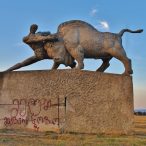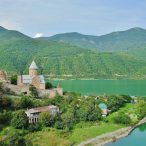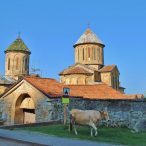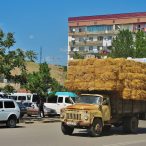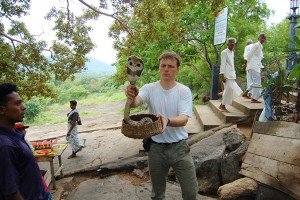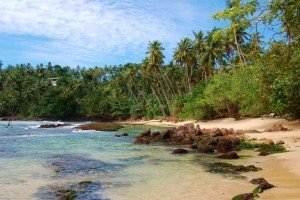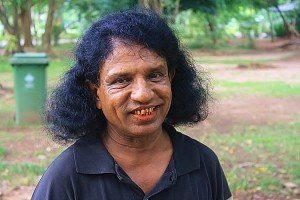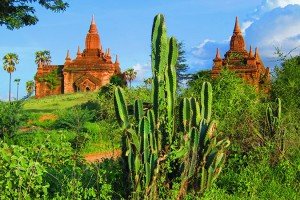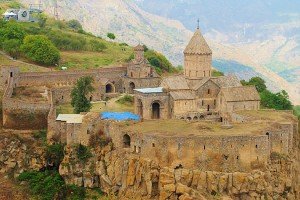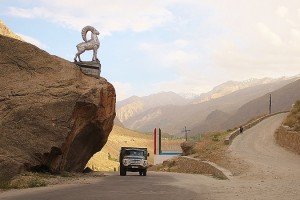Georgia
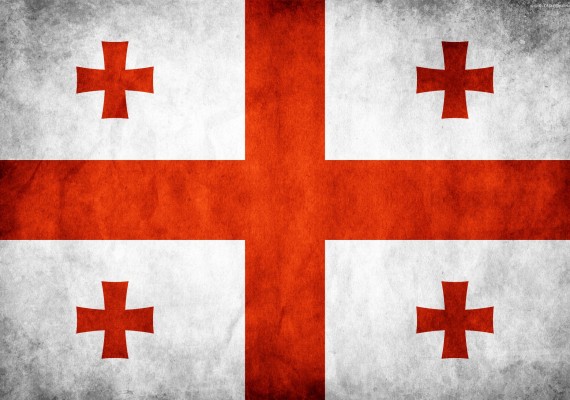
Official name: Republic of Georgia
Population: 3 996 000
Area: 69 875 km²

Gallery
Tourist attractions of Georgia, Georgia – the present times, history of Georgia.
Tourist attractions of Georgia
Georgia is attractive to tourists in many ways, of which the best are ancient churches built in the mountains and by picturesque lakes. In addition to good conditions for beautiful landscape photos Georgia also offers mountaineering expeditions to the wild places and a destination for those who enjoy close contact with nature, who like to sleep in tents and make their own fires, and more ambitious tourists can also conquer peaks and glaciers. A lot of trails lead to historic churches and the ones I would like to mention are Ananuri – about 60km from Tbilisi, which is a beautifully situated monastery by the lake among the mountains, and Tsminda Sameba in Kazbegi which is one of the biggest religious attractions of Georgia combined with a nice trek.
Every church is different from one other and each one of them boasts with a special atmosphere. In some of them there are several hundred years old frescoes on the walls and beautiful altars of Jesus and Mary and there are always candles to light what gives a sense of peace. Georgian churches, their location and adventure associated with getting to them are all great tourist attractions and to some also a way of refreshing their Christian spirit. Near the town of Kutaisi, which I recommend because of the its cheeses and cakes, there are also very attractive churches in the mountains such as Gelati and Matsometa where getting is fairly easy. On the way they are trees with pomegranates which the national fruit of Georgia.
Among the many mountain walks which I had in Georgia my first was my favourite. I went to the town of Mestia in Svanetia which even though was a well-known tourist centre it gave the possibility of remoteness, interacting with interesting people and history lesson because of its distinctive towers. Mestia is a town built of mountain rocks, with wooden fences and homely cuisine, and despite the growing tourism it gave me a pleasant feeling of rural atmosphere. While there I went on a trip through the mountains to the Chalati glacier what turned out to be a unique adventure. I was passed mountain slopes walking along rushing river and then I got to an open, rocky area which ended with a glacier. Then I pitched a tent, I started my fire and I spent the night in the mountains. The second expedition was an exhausting climb to Kuruldi lakes and in even though the lakes themselves were not great, the view of yellow flowers and grazing cattle at the background of snow-capped mountains of the Caucasus were worth my effort. I have a lot of such stories.
In Georgia I also recommend the ancient town of Mtskheta and not far from there the Jvari monastery from the VI century. I also liked the little town called Alkacihe with its Rabati fortress and the beautiful Sapara monastery where I bought myself a small cross. Apart from clean air, fast flowing rivers and churches in the mountains I also recommend rock cities. Vardzia is the biggest one but I also went to Davit Gareja and Uplicihe. Georgia is also a country of hinkali and hachapuri dumplings and helpful and hospitable people. When it comes to other attractions I also recommend the capital city of Tbilisi and the city of Batumi by the Black Sea, and a little town of Kobuleti 30km from there. Georgia also has its famous Borjomi water and a healthy town called by the same name. I don’t recommend lonely travellers staying there but owners of beautiful ladies should definitely take the opportunity because it is a nice place. Another very interesting but also a very sad place is the Stalin’s museum in Gori which is a very good example of how history can lie.
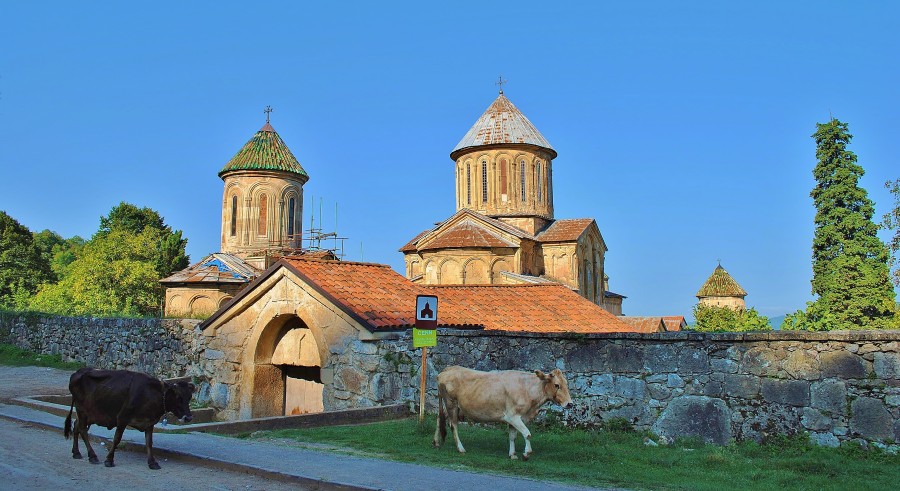
Gelati Church in the town of Kutaisi. Georgia.
I definitely recommend Georgia for adventurous, healthy and Christian holidays. To more ambitious travellers I advice a mountain expedition around Kakhetia. I also recommend my article titled: “The Stalin Museum in Gori”.
Georgia – the present times
Economy
After collapse of the Soviet Union in the early 1990s Georgian economy was in a very bad state, although in the 2000s the country began to recover. Then in 2006 and 2008 the World Bank named Georgia the country of quickest reforms; partly because Georgians who work in Russia paid money into Georgian banks which total to 7% of GDP.
Agriculture is also a big part of the Georgian economy as 55% of the population work in that sector. The most often grown crops are: grapes, citruses, nuts, tobacco, rice and tea. Apart from crops there is a big importance of raising livestock, such as: sheep, pigs and chickens. Georgia is also rich in natural resources and minerals such as: copper ore, coal, gold and tungsten, although Georgia has also big deposits of marble, clay and peat which are used in construction. Unfortunately gas has to import, before from Russia and now from Azerbaijan. Currently Georgia is developing and the Georgian government is aiming to rebuild the ancient Silk Road to use the geographic location of Georgia as a bridge between Europe and Asia in order to transport energy. For this purpose roads and oil tunnels are being built which come from Central Asia, through Caucasus into Europe.
Soon after the collapse of the Soviet Union Russians shifted a lot of factories and heavy industry, which had by the way a terrible impact on nature. This situation resulted in a great economic crisis and huge corruption which Georgia has not fully come yet. Regardless however, apart from the industries which I mentioned above, there are also factories working in such sectors as: wood, food and drink processing, machines and tools, planes, steal, chemicals, textiles and electrical appliances. Also Caspian Sea is an important part in the Georgian economy, which is a great mean of transport and the place of oil and gas supply from Turkey what gave a lot of profitable, foreign investments and new jobs. Apart from that Batumi by the Black Sea is a famous sea resort with a lot of hotels and night life. Georgia also plans to build a hydropower plant although this still requires a lot of investments. The main trade partners of Georgia are: Russia, Turkey and Azerbaijan.
I think that the biggest problem of Georgia is unemployment, which nationally has reached 16%, and within young population from 15-24 it is 35.5%, and this is even when we take into account all Georgians who work in Russia. Apart from that there is also a conflict in Abkhazia and South Ossetia, but at least Georgia has improved in fighting corruption and collecting taxes.
According to data from 2010 9.7% of people in Georgia live below the poverty level.
Education
At the very base of the system education in Georgia is free and compulsory for the ages 6 to 18, although statistic data say something different. Primary enrollments stand at 87%, and although schools themselves are free, books and other things cost so much money that a lot of people decide to not educate their children. It was counted that about 48.000 children do not go to primary schools, what means that about 5% of all children in a school age do not get any education. Unfortunately it is combined with using children to work in a full number of hours for the lowest wages, and often in difficult conditions. Literacy level stands at 99.7%.
Health
Together with the collapse of the Soviet Union budget allocated towards health service shrunk significantly, and population of Georgia also shrunk 5 times the previous number and the country became unstable including the civil war. In 1990 health budget per one person was $13, and in “free” Georgia it is only $1 per person. Unfortunately the guilt for it takes a very bad economy because despite of many reforms carried out in Georgia, despite many doctors and personnel and about 320 hospital beds per 100.000, about 30% of people delay their doctor appointments due to financial reasons. Even though the health care is in theory free, the treatment itself is too expensive for Georgians, what creates even more expensive private care and a lack of health care in country sides. Also, there is not enough equipment in hospitals what means that the care is very bad.
In 2007 the government of Georgia allocated 8% of its GDP to health care, what means that only 18.4% of all necessities are funded by the government, and over 70.9% comes from the empty pockets of Georgians. As in all countries of the former Soviet Union smoking is responsible for all illnesses, and in Georgia 50% of all people are addicted to smoking. The main reasons for deaths are strokes, digestion illnesses and a lot of accidents. In 2010 newborns mortality stood at 15 per 1000 and children mortality to the age of 5 stood at 17 per 1000. Maternal deaths at natural births amounted to 8 per 100.000. The average life expectancy is about 74 years, although it is interesting that because of smoking men live on average 69 years and women 79.
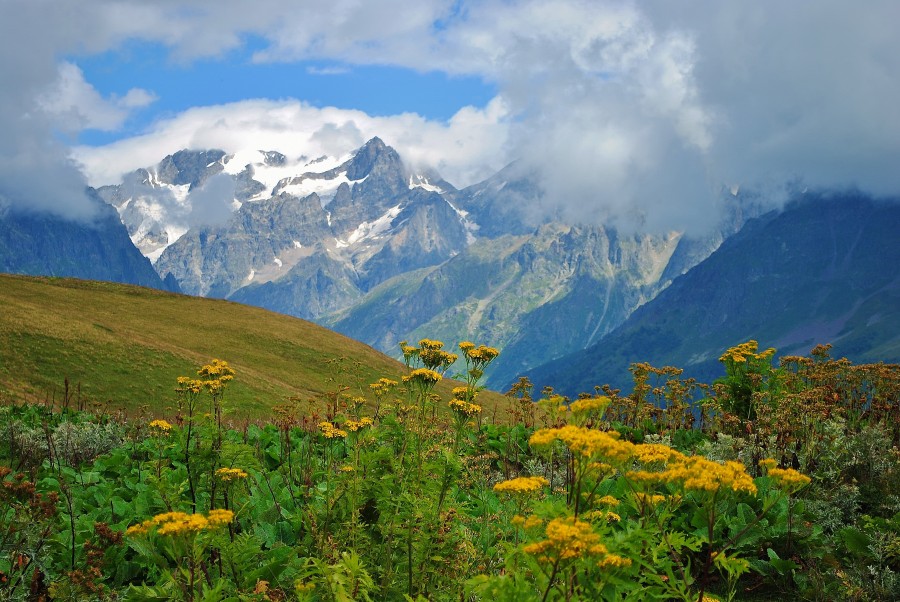
View from the village of Mestia, during my trip to the Chalati Glacier. Georgia.
When it comes to HIV Georgia is a country of low risk (around 4000 infected) although according to experts the disease can spread quickly. Also, there are still a lot of legends about AIDS in Georgia. Condoms are rarely used, there are also sexual contacts with other nations and there is also a bad health care and drug abuse. Another risk comes also from homosexuality which is a cradle of all disease.
Culture/Religion
Georgia lies on the ancient Silk Road, on the borders of Europe and Asia and that’s why its culture has European, Turkish and Persian elements. Apart from that Georgia was occupied by the Soviet Union what also played its part on the local culture. There are also several cultural minorities in Georgia, such as: Abkhazia, South Ossetia and Ajaria, but there are also Azeris, Armenians, and Russians, and in smaller numbers also Chechens, Kurds and Jews. The Georgian culture is based on Christianity because most Georgians (84%) belong to the Georgian and the Eastern (Greek) Orthodox Church. Georgia took Christianity in the III BC. Another minority are also Muslims (10%). As we can see despite the small size Georgia has a lot of social groups speaking different languages although Georgian is the national one, spoken by almost 4mln people in the country and 0.5mln abroad.
Georgia is also famous for its great wine, churches built in the mountains and the culture of attachment to the land. Georgia has also its music and dance, its painting – often based on sacred art. People are also a big advantage of Georgia, their hospitality and their cuisine combining the elements of Persia and the Mediterranean. In the times of the Soviet Union Russians carried out Russificaton of Georgia, but they faced a great opposition and after gaining independence the culture started to develop again. Family life I describe as traditional. There are no arranged marriages (apart from Muslims) a women take care of home and children. Also raising children is concentrated on productivity because boys are taught how to use tools and girls how to take care of a home. But as the time goes this habits change because Georgia has a lot of well educated women who earn more than men.
Media
Freedom of press and speech is very limited in Georgia. The main medium is TV and there are also a lot of magazines in Tbilisi, and all of them are controlled by the government. The press freedom index describes this situation in the best way, because out of 179 countries and territories in 2013 Georgia took 100th place, behind such countries as Lesotho, Liberia or Mali. TV stations and publishers are regularly terrorised and bribed.
Environmental issues
As in all countries of the Soviet Union, also in Georgia they build a lot of factories and installed heavy industry what caused pollution of the environment. In the times of the Soviet Union the environment did not matter at all. That’s why today Georgia has big problems with air pollution and a big part of agricultural fields has been lost due to erosion. Big factories producing chemicals and steal contributed to the pollution of Black Sea and river Kura. Because of water poisoning in Georgia there is a great number of digestive system illnesses. The Georgian government does not care about the rubbish utilization too, and that’s why all industrial wastes are “utilized” directly to the environment. Apart from that Georgia uses ten of thousands of tons of pesticides what contributed to toxicity of soil.
As if that was not enough in the Lagluji peak the ‘splendid’ government of the Soviet Union buried 2.5 tonnes of toxic wastes at the depth of 20 metres. For now the government of Georgia explains its slow response to the environmental problems by bad economy what is true, because the level of life in Georgia is low. When to comes to problems such as: climate warming, ozone hole, ice melting and protection of fauna and flora, the government of Georgia signed an international agreement but it is just another worthless document. Years before nature in Georgia used to be pristine, but today the natural beauty is being destroyed and it suffocates in its stench, and additionally ice melting interferes with rivers, irrigation of fields and it makes people’s lives more difficult.
I want to add that when it comes to climate warming I am very sceptical about it because I have never checked by myself. I’m afraid that it might be just another way of turning attention from true problems.
History of Georgia
First evidence about creation of Georgia come from 2500 years ago, and Georgian language is one of the oldest languages in the world and it has its own alphabet. The capital city of Georgia, Tbilisi is 1500 years old. In the IV century, as the second country in the world Georgia adopted Christianity what with a unique language and alphabet has guaranteed a specific national identity. Unfortunately throughout the centuries Georgia lived under occupation of stronger countries. To be more precise, from the I century A.D. to the XVIII century Georgia was attacked and became a part of: the Persian Empire, the Roman Empire, Byzantium, Arabia, the Mongolian Empire and the Ottoman Empire. Between the XI and the XII centuries, in the times of the most prominent rulers as King David “the Builder” and Queen Tamara, Georgia finally ceased to be an independent state. In 1783 King Katli signed a deal with Russians in Georgiewsk, which made Georgia a Russian protectorate.
In 1801 the Russian Empire started a partial process of annexing Georgia to its territory, what meant that Georgia got divided into two countries (1801-1991) and ruled by Moscow and Sankt Petersburg. However not long after that, because of strong nationalist movements and the fall of tsarist Russia, in 1918 the first Republic of Georgia was born. Independence did not last long because the red army invaded Georgia in 1921 and it annexed it to the Soviet Union. After the war Georgia was the richest and the most privileged of the Soviet republics and the beaches of Batumi by the Black Sea where treated by Russian as the Soviet Riviera. On the 9th of April 1991 Georgia announced its independence from the Soviet Union.
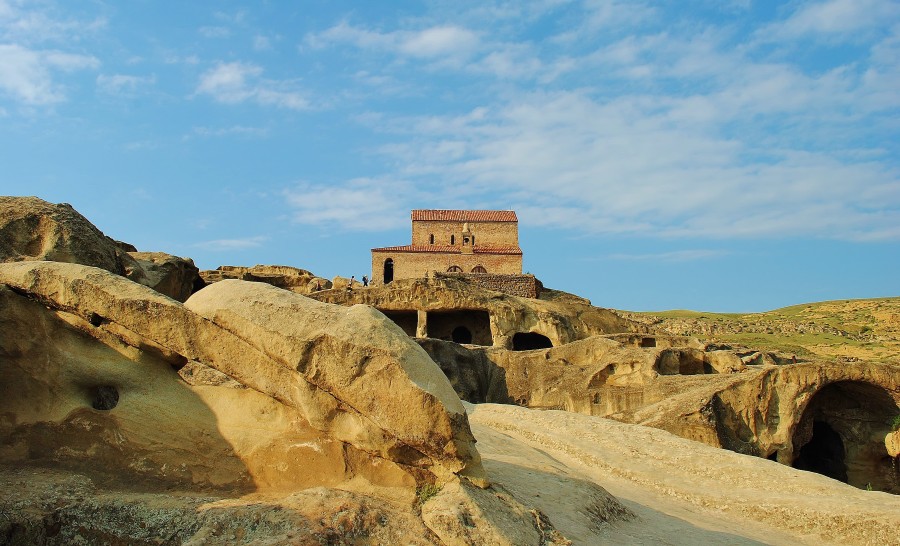
Uplistsikhe – an ancient cave town in Georgia, near Gori (Stalin’s birthplace).
After 1991 Georgia become stabilizing although officially regions as Abkhazia and South Ossetia are fighting for its independence what puts a great pressure on Georgia. I also want to add that those two regions are officially in the Georgian territory but they are out of Georgian control, and this problem is additionally ignored by the pseudo peace organization of the UN. The problem is that Abkhazia and South Ossetia are populated by Russians in 95% and those regions are supported economically and politically and they are armed by Russia. The final stage of this conflict was when Abkhazia announced its independence and Georgia invaded it, what in effect, according to the Western media Russia invaded Georgia in 2008. In my point of view however Russia can’t take the whole blame because first Georgia invaded Russians living in Abkhazia and South Ossetia, and Russia pushed out the Georgian army from those regions to protect their people, although Russia went too far anyway. This proves that it is always better to keep the country ethically clean.
Today there are still about 10.000 Russian soldiers in Georgia. In my point of view Georgia is a playground of dirty political games and it is still controlled by Russia. Today Georgia is developing and the Georgian government is trying to rebuild the importance of the ancient Silk Road to use geographical location of Georgia as a bridge between Europe and Asia for transporting energy.
When we think about Georgia we always recall the beautiful mountains and ancient churches, but Georgia also gave lives to such enemies of Poland as: Stalin, a sadist and a pervert Beria, and Orjonikidze. On the other hand the same people killed Georgians too.
A must read:
Travel reports
Map
Location
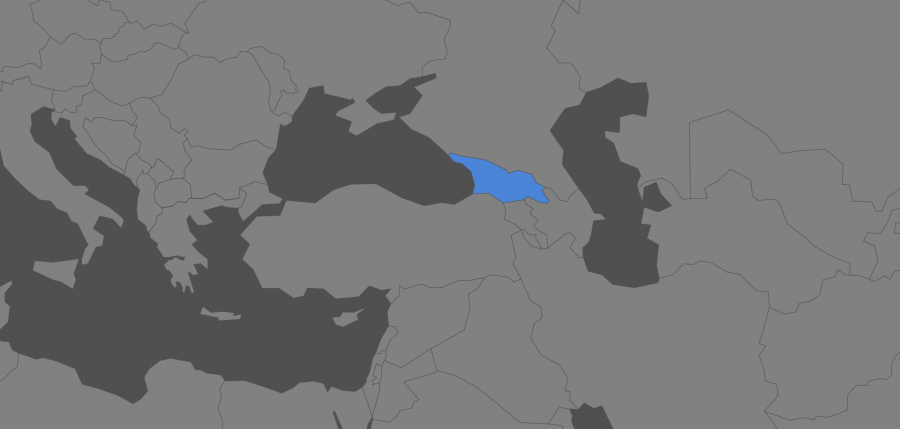
Practical information
Tourist visa: All citizens of the EU get a free stamp into passport which allows us to stay in Georgia up to 360 days. Passport or the national id should be valid for at least another 6 months. As we can see Georgia is a very open country.
Safety: I travelled 3 weeks around Georgia and regardless of the part of the country or time of a day I always felt safe. People were always helpful, hospitable and eager to talk. From what I know Abkhazia is also safe but when it comes to South Ossetia I recommend getting a more detailed advice before departure. Georgia is a safe country for tourists.
Getting around the country: I was getting around Georgia by minibuses (marshrutka) which are available in every part of the country. The bus network is very well organized. Transport prices are very cheap even for people on small budgets. Another good way of getting around Georgia is hitchhiking, thanks to which I saw more remote parts of the country. Whilst standing on the road someone always stopped after a short time, what proves the good character of Georgians.
Prices: (in 2013 when £1 = 3GEL) Georgia is a cheap country for tourists where it is possible to experience a lot of beautiful adventures for small money. For a cheap room I paid 15 lari and once in Tbilisi I paid 10 lari. For a meal I paid on average 3-5 lari and for a cup of tea just 1 lari. Transport is also very cheap but only in the lowlands. Sometimes for a 200km drive I paid only 6 lari and smaller distances I went through for just 2-4 lari. The only transport which is expensive is the mountainous transport in remote regions without roads, where you need 4×4 jeeps. The above prices I listed only for travellers on a low budget because the rich do not have to worry about the money. It is also worth pointing out that it is possible to spend a lot less. A lot of people (including me) went to Georgia with a tent and light camping equipment, they shop in cheap stores and they live in the bosom of the nature moving around by hitchhiking. This means that if someone wants to live in Georgia in a very adventurous way they can spent just 3 lari = £1 a day.
Climate: For such a small territory as Georgian the climate is very diverse because of geographical location and formation of the country. Generally the Georgian climate is defined as wet subtropical, what means that in the warmest summer months the air temperature reaches 34°C, and in the winter months around 11°C. On the other hand there are also extremes in both sides because the temperature varies from -27°C to 44°C. Those differences are best seen in the nature during travelling around Georgia. In the same time palm trees grow in Batumi, and in the mountains in the north there is a limit of eternal snow. In the winter time there are also hurricanes, tornadoes and snow storms. The best time to visit Georgia are therefore spring and summer.



